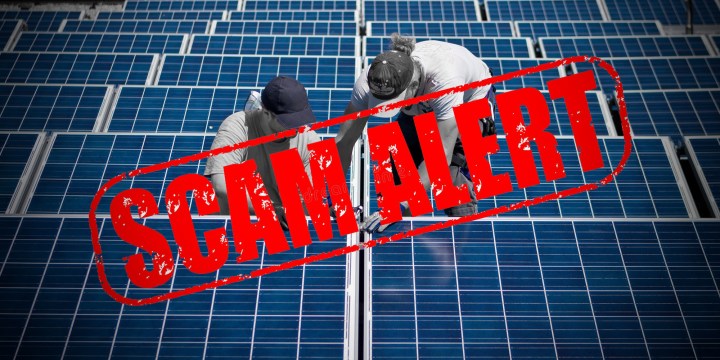HUNGER FOR POWER
Consumer ombud warns on DIY solar installations and fly-by-night operators

The office says it has seen an uptick in complaints and in nearly half the cases, suppliers won’t cooperate with its investigations.
It’s been labelled the “new gold rush” and it seems scammers will scam. The Consumer Goods and Services Ombud (CGSO) has issued an alert that it has seen an uptick in the number of complaints about solar systems and generators — and almost 50% of suppliers are simply refusing to cooperate with the office’s investigations.
The ombud says that from 1 February 2022 to 9 February 2023, there were 202 complaints relating to solar systems and generators. Most of these complaints relate to the following:
- Installers are failing to issue compliance certificates to show that their products comply with the Occupational Health and Safety Act. This includes not disclosing the criteria that need to be met for such a compliance certificate to be issued, or that an additional fee needs to be paid.
- Accepting payment and not delivering the goods or not installing the systems within the agreed timeframes.
- Poor workmanship and installation.
- Warranties not being honoured.
- Incorrect equipment bought either by or for consumers, and suppliers refusing to accept returns.
- No aftercare services.
- Misleading advertising relating to the type, size and wattage of inverters, solar panels and batteries.
- Inflated prices for panels, inverters, batteries and installation services.
The ombud, Magauta Mphahlele, advises against going the DIY route with solar as most consumers lack awareness and technical knowledge about the product and installation. Incorrect installation could also nullify the manufacturer’s warranties.
“Consumers are, generally speaking, not clued up on the requirements of systems or their limitations. As a result, consumers are suffering enormous financial losses by purchasing incorrect equipment and/or appointing unqualified installers.”
Forty-six percent of cases have had to be terminated due to a lack of cooperation from suppliers. Mphahlele says this is of great concern because it meant that complainants did not receive any redress.
“This outcome proves that there are high levels of non-compliance around the Consumer Protection Act [CPA] in this sector, and we call on suppliers and installers of solar systems and generators to ensure that their service standards meet the requirements of the CPA and other manufacturing and safety standards required in terms of other laws of this country.”
So far, the ombud has resolved 134 complaints, giving consumers a total of R277,273 in refunds. It has also instructed suppliers to rectify shoddy workmanship and replace faulty inverters, solar panels, generators and batteries.
Tips from the ombud to avoid a costly mistake:
Go with a pro: Contact a reputable solar installer to assess your needs and the structure of your home to advise on the type of system you require, because the CPA does not offer protection from “change of heart” purchases, only quality issues. “You are only covered if you provided the correct specifications or communicated the purpose for which you want to use the product, and the product is not fit for the purpose communicated.”
Get a certificate of compliance: Insurance companies and manufacturers will repudiate your claim if the system was not installed by an accredited installer.
Shop around: Obtain several quotes and verify the credentials of the installer.
Protect your equipment: Ensure that your inverter and batteries have surge protection.
Cover yourself: Don’t pay fully upfront and familiarise yourself with the terms and conditions relating to cancellations and refunds of deposits.
The South African Photovoltaic Industry Association has listed accredited solar installation companies on its website. DM/BM

















I have encountered the issue of earthing. There are reports of issuers of Certificates of Compliance issuers demanding a ‘spike’ earth, and installers preferring earthing to the grid earth at the distribution box. What is the standard? I am hoping for an authoritative reply to this comment.